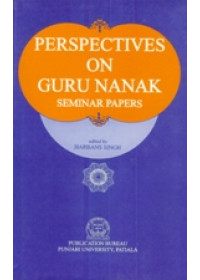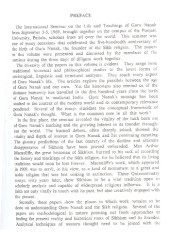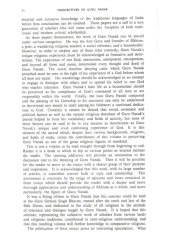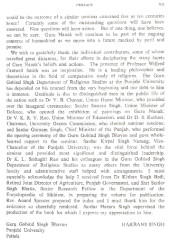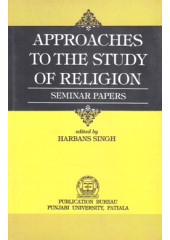Monday to Saturday - 10:00 Am to 9 PM
Now Enjoy Bulk Discounts on Books as Mentioned Below
These Discounts are in addition to the Discounts on Individual Books (Visible as Bulk Discount for Books in Cart)
Extra 10% Off If Books Purchased Exceeds Rs 3000 or 75 USD or 60 GBP or 60 Euro or 100 AUD or 100 CAD
Extra 15% Off If Books Purchased Exceeds Rs 6000 or 150 USD or 120 GBP or 120 Euro or 200 AUD or 200 CAD
Extra 20% Off If Books Purchased Exceeds Rs 15000 or 225 USD or 180 GBP or 180 Euro or 300 AUD or 300 CAD
Extra 25% Off If Books Purchased Exceeds Rs 30000 or 300 USD or 240 GBP or 240 Euro or 400 AUD or 400 CAD
Preface Of The Book 'Perspectives on Guru Nanak - Seminar Papers' By Harbans Singh
The International Seminar on the Life and Teachings of Guru Nanak from September 3-5, 1969, brought together on the campus of the Punjabi University, Patiala, scholars from all over the world. This seminar was one of many occasions that celebrated the five-hundredth anniversary of the birth of Guru Nanak, the founder of the Sikh religion. The papers in this volume were presented and discussed by the members of the seminar during the three days of diligent work together.
The diversity of the papers in this volume is evident. They range from traditional historical and philosophical studies to the latest forms of sociologocal, linguistic and structural analyses. They touch every aspect of Guru Nanak's life. The articles explore the parallels between the age of Guru Nanak's life. The articles explore the parallels between the age of Guru Nanak and our own. Yet the historians also remind us of the distance humanity has travelled in the five hundred years since the birth of Guru Nanak in medieval India. Guru Nanak's message has been studied in the context of the modern world and its contemporary relevance pondered. Several of the essays elucidate the conceptual framework of Guru Nanak's thought. What is the common core in all this work ?
In the first place, the seminar revealed the vitality of the faith born out of Guru Nanak's teachings and the growing interest in its founder throughout the world. The learned debate, often sharply joined, showed the vitality and depth of interest in Guru Nanak and his continuing meaning. The gloomy predictions of the last century of the decline and ultimate disappearance of Sikhism have been proved unfounded. Max Arthur Macauliffe, the great historian of Sikhism, hurried to his task of recording the history and teachings of the Sikh religion, for he believed that its living traditions would soon be lost forever. Macauliffe's work, which appeared in 1909, was to serve, in his view, as a kind of monument to a great and noble religion that was fast sinking to extinction. These Quincentenary essays, sixty years later, show Sikhism to be a vital tradition open to scholarly analysis and capable of widespread religious influence. It is a faith not only vitally in touch with its past, but also creatively engaged with the present.
Secondly, these papers show the places in which work remains to be done on understanding Guru Nanak and the Sikh religion. Several of the papers are methodological in nature pointing out fresh approaches to finding the present reality and historical roots of Sikhism and its founder. Analytical techniques of western thought need to be joined with the detailed and extensive knowledge of the traditional languages of India before firm conclusions can be reached. These papers are a call to a new generation of scholars who will come under the discipline of both traditional and modern critical scholarship.
As the papers demonstrate, the work of Guru Nanak can be placed under various categories. He was the first Guru and founder of Sikhism, a poet, a wandering religious teacher, a social reformer and a householder. However, in order to employ any of these titles correctly, Guru Nanak's unique religious experience of one God, omniscient, omnipotent, omnipresent, and beyond all form and name, determined every thought and deed of Guru Nanak. The social doctrine denying caste which Guru Nanak preached must be seen in the light of his experience of a God before whom all men are eaqual. His wanderings should be acknowledged as an attempt to engage in dialouge with others and to spread his belief in one God who teaches tolerance. Guru Nanak's later life as a householder should be perceived as his compliance of God's command to all men to act responsibly within the world. Finally, the bani Guru Nanak composed and the passing of his Guruship to his successor can only be understood as devotional acts meant to instil among his followers a continued dedication to God. Certainly it cannot be denied that social, economic and political factors as well as the various religious doctrines of Guru Nanak's period helped to form his vocabulary and fields of activity, but none of these factors can be said to be in any manner as determinate as Guru Nanak's unique and vivid continuing experience of God. It is this element of the sacred which, despite their various backgrounds, religions, and fields of study, unites the contributors of this volume in perceiving Guru Nanak as one of the great religious figures of mankind.
This is not a volume to be read straight through from beginning to end. Rather it is a book in which to dip at various points as interest inclines the reader. The opening addresses will provide an orientation to the discussion and to the meaning of Guru Nanak. Then it will be possible for the reader to move to the essays with a clearer grasp of their purpose and inspiration. It is acknowledged that this work, with its large number of articles, is somewhat uneven both in style and scholarship. This unevenness is overcome by the range of opinions and views contained in these essays which should provide the reader with a deeper and more thorough appreciation and understanding of Sikhism as a whole, and more particularly , the figure of Guru Nanak.
It was a fitting tribute to Guru Nanak that this seminar could be held at the Guru Gobind Singh Bhavan, named after the tenth and last of the Sikh Gurus, and dedicated to the study of all religions in the attitude of tolerance and dialogue taught by Guru Nanak. It is hoped that this seminar, representing the collective work of scholars from various lands and religious traditions, contributed to inner-religious understanding, and that this resulting volume will further knowledge in comparative religions.
The publication of these essays poses an interesting speculation. What would be the outcome of a similar seminar convened five or ten centuries hence? Certainly some of the outstanding questions will have been answered. New questions will have arisen. But of one thing, one believes, we can be sure. Guru Nanak will continue to be part of the ongoing concerns of humankind as we move into a future marked by peril and promise.
We wish to gratefully thank the individual contributors, some of whom travelled great distances, for their efforts in deciphering the many facets of Guru Nanak's beliefs and actions. The presence of Professor Wilfred Cantwell Smith was an inspiration. He is a leading philosopher and theoretician in the field of comparative study of religions. The Guru Gobind Singh Department of Religious Studies at Punjabi University has depended on his counsel from the very beginning and our debt to him is immense. Gratitude is due to distinguished men in the public life of the nation such as Dr Y. B. Chavan, Union Home Minister, who presided over the inaugural ceremonies; Sardar Swaran Singh, Union Minister of Defence, who opened the exhibition of paintings on Guru Nanak; Dr V. K. R. V. Rao, Union Minister of Education, and Dr D. S. Kothari, Chairman, University Grants Commission, who chaired seminar sessions; and Sardar Gurnam Singh, Chief Minister of the Punjab, who performed the opening ceremony of the Guru Gobind Singh Bhavan and gave wholeheartred support to the seminar. Sardar Kirpal Singh Narang, Vice-Chancellor of the Punjabi University, was the vital force behind the seminar and provided most significant and distinguished leadership. Dr K. L. Seshagiri Rao and his colleagues in the Guru Gobind Singh Department of Religious Studies as many others from the University faculty and administrative staff helped with arrangements. I must especially acknowledge the help I received from Dr Kishan Singh Bedi, Retired Joint Director of Agriculture, Punjab Government, and Shri Sardar Singh Bhatia, Senior Research Fellow in the Department of the Encyclopaedia of Sikhism, in preparing the volume for publication. Rev. Anand Spencer prepared the index and I must thank him for the assistance so cheerfully rendered. Sardar Hazara Singh supervised the production of the book for which I express my appreciation to him.
| Guru Gobind Singh Bhavan | HARBANS SINGH |
| Punjabi University | |
| Patiala |
Table of Contents of the Book 'Perspectives on Guru Nanak - Seminar Papers' By Harbans Singh
| C O N T E N T S | ||
| I | THE VICE-CHANCELLOR'S WELCOME ADDRESS: | |
| Sardar Kirpal Singh Narang | 1 | |
| II | THE CHANCELLOR'S INTRODUCTORY ADDRESS: | |
| Dr D. C. Pavate | 7 | |
| III | INAUGURAL ADDRESS: | |
| Dr Yeshwantrao Balwantrao Chavan | 11 | |
| IV | GURU NANAK AS HISTORICAL MEMORY AND | |
| CONTINUING REALITY: | ||
| Harbans Singh | 15 | |
| V | THE RELIGIOUS, THE SACRED AND THE HOLY : | |
| GURU NANAK AND SECULARISM : | ||
Perspectives on Guru Nanak - Seminar Papers - Book By Harbans Singh
- Brand: Punjabi-University-Patiala
- Product Code: SGE161
- Availability: In Stock
-
Rs.350.00
Related Products
Guru Nanak Dev Ji - GN8
Posters of Guru Nanak Dev Ji on Photographic Paper in Excellent Print Quality - We Supply Posters..
Rs.144.00
Guru Nanak Dev Ji - GN16
Posters of Guru Nanak Dev Ji on Photographic Paper in Excellent Print Quality - We Supply Posters..
Rs.144.00
Guru Nanak And Origins of the Sikh Faith - Book By Harbans Singh
Foreword To The Book 'Guru Nanak And Origins of the Sikh Faith' By Harbans Singh DURING the terce..
Rs.150.00
Approaches To The Study Of Religion - Book By Harbans Singh
Preface To 'Approaches To The Study Of Religion' By Harbans Singh The study of religion has y..
Rs.200.00
Guru Nanak Dev Ji - GN380
Posters of Guru Nanak Dev Ji on Photographic Paper in Excellent Print Quality - We Supply Posters..
Rs.144.00
Guru Nanak Dev Ji - GN549
Posters of Guru Nanak Dev Ji on Photographic Paper in Excellent Print Quality - We Supply Posters..
Rs.144.00
Guru Nanak Dev Ji - GN1343
Posters of Guru Nanak Dev Ji on Photographic Paper in Excellent Print Quality - We Supply Posters..
Rs.144.00
Guru Nanak Dev Ji - GN1083
Posters of Guru Nanak Dev Ji on Photographic Paper in Excellent Print Quality - We Supply Posters..
Rs.216.00
Tags: books guru gobind singh, books on sikh gurus, books on teachings of guru nanak, sakhis of sikh gurus, teachings of guru gobind singh, teachings of sikh gurus perspectives, seminar, papers, harbans, english

